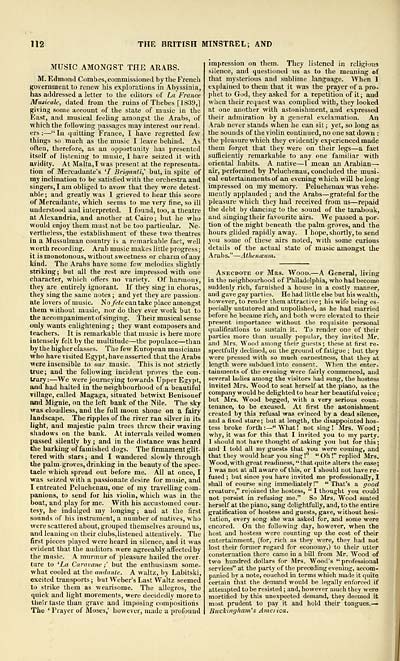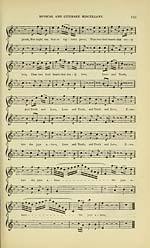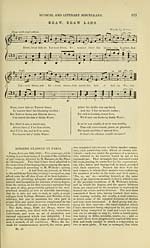Glen Collection of printed music > Printed music > British minstrel, and musical and literary miscellany
(120) Page 112
Download files
Complete book:
Individual page:
Thumbnail gallery: Grid view | List view

112
THE BRITISH MINSTREL; AND
MUSIC AMONGST THE ARABS.
M. Edmond Combes, commissioned by the French
governmeat to renew his explorations in Abyssinia,
has addressed a letter to the editors of La France
Miisicale, dated from the ruins of Thebes [1839,]
giving some account of the state of music in the
East, and musical feeling amongst the Arabs, of
which the following passages may interest our read-
ers : — "In quitting France, I have regretted few
things so much as the music I leave behind. As
often, therefore, as an opportunity has presented
itself of listening to music, I have seized it with
avidity. At Malta, I was present at the representa-
tion of Mercadante's '/ Briganti,' but, in spite of
my inclination to be satisfied with the orchestra and
singers, I am obliged to avow that they were detest-
able; and greatly was I grieved to hear this score
of Mereadante, which seems to me very fine, so ill
understood and interpreted. I found, too, a theatre
at Alexandria, and another at Cairo ; but he who
would enjoy them must not be too particular. Ne-
vertheless, the establishment of these two theatres
in a Mussulman country is a remarkable fact, well
worth recording. Arab music makes little progress;
it is monotonous, without sweetness or charm of any
kind. The Arabs have some few melodies slightly
striking; but all the rest are impressed with one
character, which offers no variety. Of harmony,
they are entirely ignorant. If they sing in chorus,
they sing the same notes ; and yet they are passion-
ate lovers of music. No fete can take place amongst
them without music, nor do they ever work but to
the accompaniment of singing. Their musical sense
only wants enlightening ; they want composers and
teachers. It is remarkable that music is here more
intensely felt by the multitude — the populace — than
by the higher classes. The few European musicians
who have visited Egypt, have asserted that the Arabs
were insensible to our music. This is not strictly
true; and the following incident proves the con-
trary: — We were journeying towards Upper Egypt,
and had halted in the neighbourhood of a beautiful
village, called Magaga, situated betwixt Benisouef
and Mignie, on the left bank of the Nile. The sky
was cloudless, and the full moon shone on a fairy
landscape. The ripples of the river ran silver in its
light, and majestic palm trees threw their waving
shadows on the bank. At intervals veiled women
passed silently by ; and in the distance was heard
the barking of famished dogs. The firmament glit-
tered with stars ; and I wandered slowly through
the palm-groves, drinking in the beauty of the spec-
tacle which spread out before me. All at once, I
was seized with a passionate desire for music, and
I entreated Peluchenau, one of my travelling com-
panions, to send for his violin, which was in the
boat, and play for me. With his accustomed cour-
tesy, he indulged my longing ; and at the first
sounds of his instrument, a number of natives, who
were scattered about, grouped themselves around us,
and leaning on their clubs,listened attentively. The
first pieces played were heard in silence, and it was
evident that the auditors were agreeably afi'ected by
the music. A murmur of pleasure hailed the over-
ture to 'La Caraoane ;' but the enthusiasm some-
what cooled at the andante. A waltz, by Labitski,
excited transports ; but Weber's Last Waltz seemed
to strike them as wearisome. The allegros, the
quick and light movements, were decidedly more to
their taste than grave and imposing compositions
Tho ' Prayer of Moses,' however, made a profound
impression on them. They listened in religious
silence, and questioned us as to the meaning of
that mysterious and sublime language. When I
explained to them that it was the prayer of a pro-
phet to God, they asked for a repetition of it; and
when their request was complied with, they looked
at one another with astonishment, and expressed
their admiration by a general exclamation. An
.\rab never stands when he can sit ; yet, so long as
the sounds of the violin continued, no one sat down :
the pleasure which they evidently experienced made
them forget that they were on their legs — a fact
sufficiently remarkable to any one familiar with
oriental habits. A native — I mean an Arabian —
air, performed by Peluchenau, concluded the musi-
cal entertainments of an evening which will be long
impressed on my memory. Peluchenau was vehe-
mently applauded; and the Arabs — grateful for the
pleasure which they had received from us — repaid
the debt by dancing to the sound of the tarabouk,
and singing their favourite airs. We passed a por-
tion of the night beneath the palm-groves, and the
hours glided rapidly away. I hope, shortly, to send
you some of these airs noted, with some curious
details of the actual state of music amongst the
Arabs." — Atlicnmmn.
Anecdote of Mrs. Wood. — A General, living
in the neighbourhood of Philadelphia, who had become
suddenly rich, furnished a house in a costly manner,
and gave gay parties. He had little else but his wealth,
however, to render them attractive ; his wife being es-
pecially untutored and unpolished, as he had married
before he became rich, and both were elevated to their
present importance without the requisite personal
qualifications to sustain it. To render one of their
parties more tlian usually popular, they invited Mr.
and Mrs. Wood among their guests ; these at first re-
spectfully declined, on the ground of fatigue ; but they
were pressed with so much earnestness, that they at
length were subdued into consent. When the enter-
tainments of the evening were fairly commenced, and
several ladies among the visitors had sung, the hostess
invited Mrs. Wood to seat herself at the piano, as the
company would be delighted to hear her beautiful voice;
but Mrs. Wood begged, with a very serious coun-
tenance, to be excused. At first the astonishment
created by this refusal was evinced by a dead silence,
and a fixed stare ; but at length, the disappointed hos-
tess broke forth : — f What ! not sing I Mrs. Wood ;
why, it was for this that I invited you to my party.
I should not have thought of asking you but for this ;
and I told all my guests that you were coming, and
that they would hear you sing I" " Oh !" replied Mrs.
Wood,with great readiness, "that quite alters the case;
I was not at all aware of this, or I should not have re-
fused ; but since you have invited me professionally, I
shall of course sing immediately !" " That's a good
creature," rejoined the hostess, ** I thought you could
not persist in refusing me." So Mrs. Wood seated
herself at the piano, sang delightfully, and, to the entire
gratification of hostess and guests, gave, without hesi-
tation, every song she was asked for, and some were
encored. On the following day, however, when the
host and hostess were counting up the cost of their
entertainment, (for, rich as they were, they had not
lost their former regard for economy,) to their utter
consternation there came in a bill from Mr. Wood of
two hundred dollars for Mrs. Wood's "professional
services" at the party of the preceding evening, accom-
panied by a note, couched in terms which made it quite
certain that the demand would be legally enforced if
attempted to be resisted ; and, however much they were
mortitied by this unexpected demand, they deemed it
most prudent to pay it and hold their tongues.—
Buckingham's Amei tea.
THE BRITISH MINSTREL; AND
MUSIC AMONGST THE ARABS.
M. Edmond Combes, commissioned by the French
governmeat to renew his explorations in Abyssinia,
has addressed a letter to the editors of La France
Miisicale, dated from the ruins of Thebes [1839,]
giving some account of the state of music in the
East, and musical feeling amongst the Arabs, of
which the following passages may interest our read-
ers : — "In quitting France, I have regretted few
things so much as the music I leave behind. As
often, therefore, as an opportunity has presented
itself of listening to music, I have seized it with
avidity. At Malta, I was present at the representa-
tion of Mercadante's '/ Briganti,' but, in spite of
my inclination to be satisfied with the orchestra and
singers, I am obliged to avow that they were detest-
able; and greatly was I grieved to hear this score
of Mereadante, which seems to me very fine, so ill
understood and interpreted. I found, too, a theatre
at Alexandria, and another at Cairo ; but he who
would enjoy them must not be too particular. Ne-
vertheless, the establishment of these two theatres
in a Mussulman country is a remarkable fact, well
worth recording. Arab music makes little progress;
it is monotonous, without sweetness or charm of any
kind. The Arabs have some few melodies slightly
striking; but all the rest are impressed with one
character, which offers no variety. Of harmony,
they are entirely ignorant. If they sing in chorus,
they sing the same notes ; and yet they are passion-
ate lovers of music. No fete can take place amongst
them without music, nor do they ever work but to
the accompaniment of singing. Their musical sense
only wants enlightening ; they want composers and
teachers. It is remarkable that music is here more
intensely felt by the multitude — the populace — than
by the higher classes. The few European musicians
who have visited Egypt, have asserted that the Arabs
were insensible to our music. This is not strictly
true; and the following incident proves the con-
trary: — We were journeying towards Upper Egypt,
and had halted in the neighbourhood of a beautiful
village, called Magaga, situated betwixt Benisouef
and Mignie, on the left bank of the Nile. The sky
was cloudless, and the full moon shone on a fairy
landscape. The ripples of the river ran silver in its
light, and majestic palm trees threw their waving
shadows on the bank. At intervals veiled women
passed silently by ; and in the distance was heard
the barking of famished dogs. The firmament glit-
tered with stars ; and I wandered slowly through
the palm-groves, drinking in the beauty of the spec-
tacle which spread out before me. All at once, I
was seized with a passionate desire for music, and
I entreated Peluchenau, one of my travelling com-
panions, to send for his violin, which was in the
boat, and play for me. With his accustomed cour-
tesy, he indulged my longing ; and at the first
sounds of his instrument, a number of natives, who
were scattered about, grouped themselves around us,
and leaning on their clubs,listened attentively. The
first pieces played were heard in silence, and it was
evident that the auditors were agreeably afi'ected by
the music. A murmur of pleasure hailed the over-
ture to 'La Caraoane ;' but the enthusiasm some-
what cooled at the andante. A waltz, by Labitski,
excited transports ; but Weber's Last Waltz seemed
to strike them as wearisome. The allegros, the
quick and light movements, were decidedly more to
their taste than grave and imposing compositions
Tho ' Prayer of Moses,' however, made a profound
impression on them. They listened in religious
silence, and questioned us as to the meaning of
that mysterious and sublime language. When I
explained to them that it was the prayer of a pro-
phet to God, they asked for a repetition of it; and
when their request was complied with, they looked
at one another with astonishment, and expressed
their admiration by a general exclamation. An
.\rab never stands when he can sit ; yet, so long as
the sounds of the violin continued, no one sat down :
the pleasure which they evidently experienced made
them forget that they were on their legs — a fact
sufficiently remarkable to any one familiar with
oriental habits. A native — I mean an Arabian —
air, performed by Peluchenau, concluded the musi-
cal entertainments of an evening which will be long
impressed on my memory. Peluchenau was vehe-
mently applauded; and the Arabs — grateful for the
pleasure which they had received from us — repaid
the debt by dancing to the sound of the tarabouk,
and singing their favourite airs. We passed a por-
tion of the night beneath the palm-groves, and the
hours glided rapidly away. I hope, shortly, to send
you some of these airs noted, with some curious
details of the actual state of music amongst the
Arabs." — Atlicnmmn.
Anecdote of Mrs. Wood. — A General, living
in the neighbourhood of Philadelphia, who had become
suddenly rich, furnished a house in a costly manner,
and gave gay parties. He had little else but his wealth,
however, to render them attractive ; his wife being es-
pecially untutored and unpolished, as he had married
before he became rich, and both were elevated to their
present importance without the requisite personal
qualifications to sustain it. To render one of their
parties more tlian usually popular, they invited Mr.
and Mrs. Wood among their guests ; these at first re-
spectfully declined, on the ground of fatigue ; but they
were pressed with so much earnestness, that they at
length were subdued into consent. When the enter-
tainments of the evening were fairly commenced, and
several ladies among the visitors had sung, the hostess
invited Mrs. Wood to seat herself at the piano, as the
company would be delighted to hear her beautiful voice;
but Mrs. Wood begged, with a very serious coun-
tenance, to be excused. At first the astonishment
created by this refusal was evinced by a dead silence,
and a fixed stare ; but at length, the disappointed hos-
tess broke forth : — f What ! not sing I Mrs. Wood ;
why, it was for this that I invited you to my party.
I should not have thought of asking you but for this ;
and I told all my guests that you were coming, and
that they would hear you sing I" " Oh !" replied Mrs.
Wood,with great readiness, "that quite alters the case;
I was not at all aware of this, or I should not have re-
fused ; but since you have invited me professionally, I
shall of course sing immediately !" " That's a good
creature," rejoined the hostess, ** I thought you could
not persist in refusing me." So Mrs. Wood seated
herself at the piano, sang delightfully, and, to the entire
gratification of hostess and guests, gave, without hesi-
tation, every song she was asked for, and some were
encored. On the following day, however, when the
host and hostess were counting up the cost of their
entertainment, (for, rich as they were, they had not
lost their former regard for economy,) to their utter
consternation there came in a bill from Mr. Wood of
two hundred dollars for Mrs. Wood's "professional
services" at the party of the preceding evening, accom-
panied by a note, couched in terms which made it quite
certain that the demand would be legally enforced if
attempted to be resisted ; and, however much they were
mortitied by this unexpected demand, they deemed it
most prudent to pay it and hold their tongues.—
Buckingham's Amei tea.
Set display mode to: Large image | Transcription
Images and transcriptions on this page, including medium image downloads, may be used under the Creative Commons Attribution 4.0 International Licence unless otherwise stated. ![]()
| Special collections of printed music > Glen Collection of printed music > Printed music > British minstrel, and musical and literary miscellany > (120) Page 112 |
|---|
| Permanent URL | https://digital.nls.uk/91436385 |
|---|
| Description | Scottish songs and music of the 18th and early 19th centuries, including music for the Highland bagpipe. These are selected items from the collection of John Glen (1833 to 1904). Also includes a few manuscripts, some treatises, and other books on the subject. |
|---|
| Description | The Glen Collection and the Inglis Collection represent mainly 18th and 19th century Scottish music, including Scottish songs. The collections of Berlioz and Verdi collected by bibliographer Cecil Hopkinson contain contemporary and later editions of the works of the two composers Berlioz and Verdi. |
|---|

